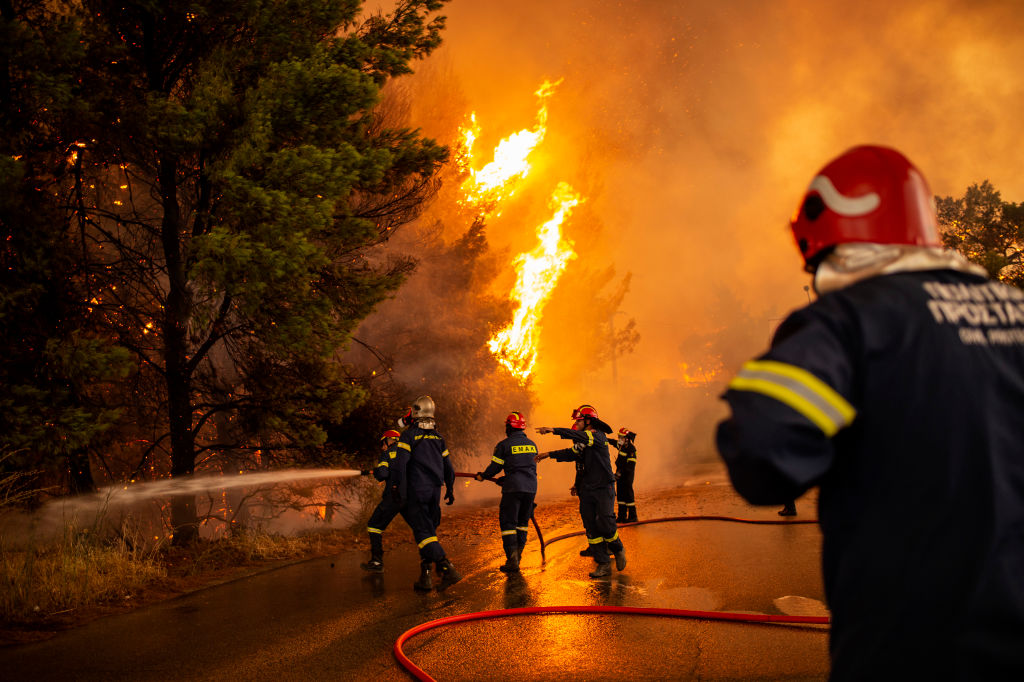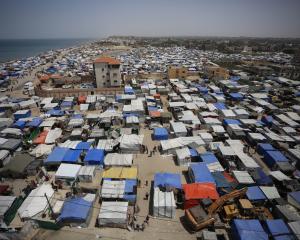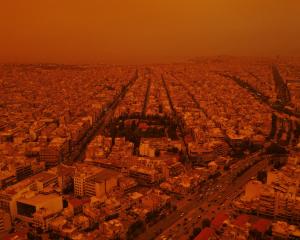
Red flames and sparks glowed in the night on the outskirts of the Greek capital, residents fled suburbs, asylum seekers were evacuated and authorities warned of more blazes on Friday (local time) as temperatures hovered around 40 degrees Celsius (107 Fahrenheit) and gale force winds were expected.
Twelve people were taken to hospital including two volunteer firefighters who were treated for burns in intensive care, health officials said.
Prime Minister Kyriakos Mitsotakis said emergency services faced a difficult night with westerly winds set to strengthen and he urged people to comply with evacuation orders and avoid unnecessary travel.
"We are dealing with unprecedented conditions as many days of heatwave have turned the whole country into a powder keg," he said in a special televised address.
With swathes of neighbouring Turkey also aflame, the smoke-filled skies have added to apocalyptic images of floods and fire seen across Europe this summer.
On the island of Evia, close to Athens, church bells rang on Thursday to warn of the fires. Some 25 villages on the island have already been evacuated with the beach resort of Agia Anna threatened late on Thursday.
"The situation is out of control. The flames are more than 40 metres high," the local mayor George Tsapourniotis told Alpha television as coast guard vessels headed to the area to help with the evacuation.
Mitsotakis said defences against the reality of climate change had to be strengthened. He said there would be time for "criticism and self-criticism" of the government's handling of the crisis but for the moment urged citizens to remain united.
Earlier, he visited an area in the western Peloponnese near the site of the ancient Olympic Games where emergency services fought all night to save one of Greece's best known archaeological sites.
SUBURBS EVACUATED
Firefighters, backed by waterbombing fixed-wing aircraft and helicopters, had managed to control some of the blazes near Athens earlier in the day.
But the heat fanned them back into life, with flames crossing the motorway connecting Athens to northern Greece and threatening more built-up areas.
Late on Thursday afternoon, authorities ordered the evacuation of a clutch of suburbs to the north of Athens and moved a group of asylum seekers from the nearby Malakasa migrant reception centre.
Tens of dozens of wildfires have broken out across Greece since Tuesday, destroying houses, forcing the evacuation of dozens of towns and villages and burning thousands of acres of forest land.
The Civil Protection Authority issued an "extreme fire warning" for half the country on Friday amid the heatwave.
The finance ministry announced emergency payments of up to 6000 euros ($US7,100) for people who had lost possessions and said more measures would follow.
Local utilities said there could be rolling power cuts in some parts of the Attica region around the capital due to the fire.
Access to parks and forests will be forbidden in the coming days, Deputy Citizens' Protection Minister Nikos Hardalias said. Additional firefighters and aircraft were expected to arrive from France, Sweden, Romania and Switzerland.

Turkey
Workers at a coal-fired power station in Turkey's southwest fled the approaching flames of a wildfire in panic before firefighters brought the blaze under control on Thursday.
Wildfires have devastated tens of thousands of hectares across Turkey's Mediterranean and Aegean provinces this summer. Eight people have died and thousands of Turks and tourists have fled, sometimes by boat.
The province of Mugla where the Kemerkoy power plant is located is one of the worst hit regions. The municipality said 55,000 hectares have been burnt - more than twice the area burnt across the whole of Turkey last year - and 36,000 people have had been evacuated.
Twelve fires were still burning in the region on Thursday, but the fires which breached the plant's perimeter on Wednesday evening had been extinguished without damaging the facility's main units, authorities said.
Sadik Akin, a 28-year-old excavator driver spent the night in the open after he saw flames approaching the coal-fired facility, where he works and lives, and fled with others.
"When we were going back to camp, we saw the fire was nearing the power plant. So we grabbed our bags in a panic and returned," Akin said.
Cooling efforts continued in the vicinity of Kemerkoy power plant, as a helicopter and plane doused the area with water, and Turkey's energy minister the plant would resume operation as soon as possible. In the morning, plumes of smoke still rose above the burnt trees around the facility.
President Tayyip Erdogan, facing criticism for his government's response to the wildfires, says they are the worst that Turkey has suffered.
Hundreds of people have sought medical treatment from the 180 fires that have broken out since July 28, most of whom have been discharged from hospital.
The blazes are the most intense in Turkey on record, a European Union atmosphere monitor said this week, with the heatwave meaning more fires and smoke pollution were likely around the Mediterranean region.
Comments
As if it was not enough that world is burning, flooding and melting, we now also have news today that climate scientists have detected warning signs of the collapse of the Gulf Stream, one of the planet’s main potential tipping points.
The research found “an almost complete loss of stability over the last century” of the currents that researchers call the Atlantic meridional overturning circulation (AMOC). The currents are already at their slowest point in at least 1,600 years, but the new analysis shows they may be nearing a shutdown.
If we do not stop this from happening by halting the increase of CO2 in the atmosphere then the world as we know it will change forever.












